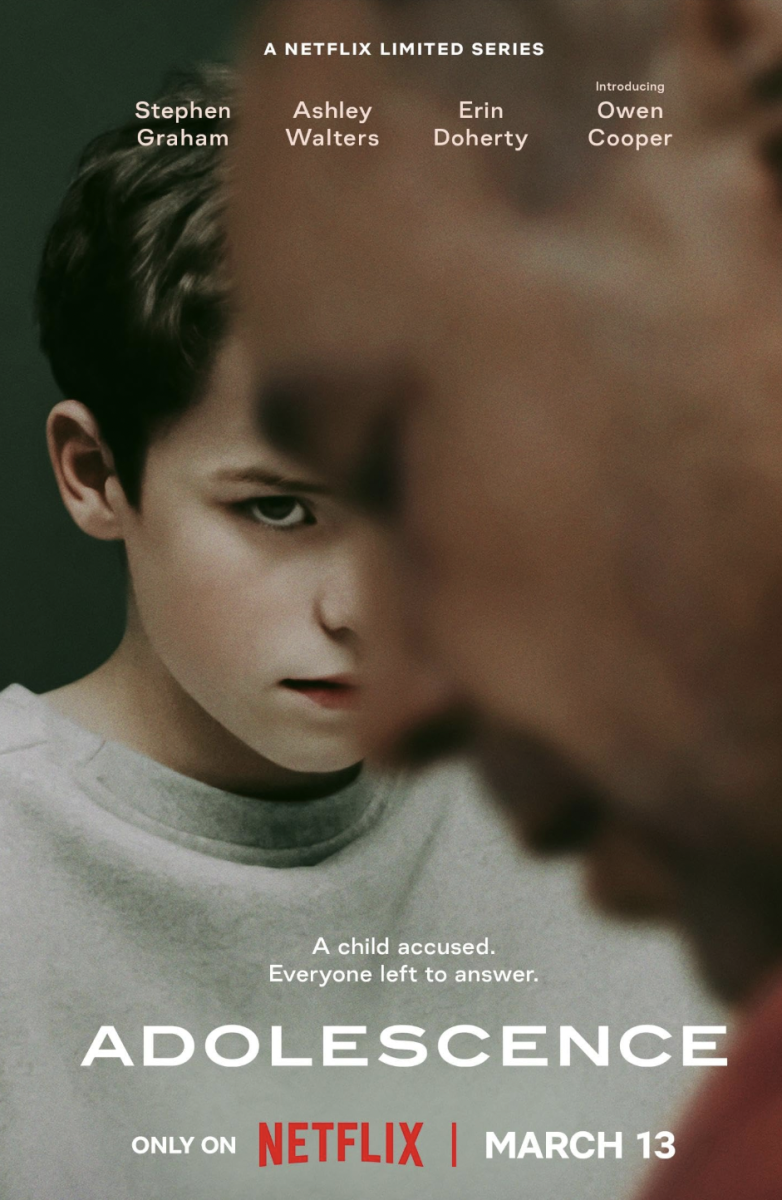On March 13, 2025, ‘Adolescence’ took Netflix by storm, as viewers were toppled by the illustrious reality of today’s society. The miniseries compelled a huge audience, as it has quickly become the most viewed limited series on Netflix, garnering around 66.3 million views and more worldwide.
The first episode develops through the rising action of the police arresting Jamie Miller, a 13-year-old boy, who was accused of a classmate’s murder. The victim of the subsequent attack was Katie, a 13-year-old girl.
The series explores the severe consequences in Jamie’s family dynamics right from the beginning of the season. We see Jamie’s father feeling perplexed and helpless as the cops take photos of Jamie’s body and fingerprints as a medical requirement during his arrest.
After still denying all his actions, Jamie and his selected “appropriate guardian” (his father) were shown a horrendous clip. The clip contained the evidence of Jamie’s brutal actions, as he stabbed Katie seven times in a parking lot. The shock and numbness the father felt after he had failed to educate his son resonated with the audience.
The series progressed to examine Jamie’s mindset, discovering the reasons behind his heinous offence. The climax or the most anticipated question behind “why” he committed such a terrible crime was answered during the third episode. Set in the juvenile center with Jamie and his psychologist, there were multiple instances of raw and unfiltered glimpses into the conversation between them.
The episode provided a harsh portrayal of Jamie’s understanding of terms such as “red/blue pill,” “80-20 rule,” “manosphere” and “incel.” His depiction provided an insight into a teenage boy’s upbringing and understanding of what is appropriate according to him.
These terms gained popularity after being used by prominent influencers such as Andrew Tate. The misogynistic influencer was in trouble after his portrayal against women deeply affected the young man and the generations that further came. “The implications of content targeted toward developing minds, and the unforeseen implications of radically changing attitudes and outlooks on topics as important as the peers you spend your every day with is only being realized recently,” said senior Ava Berry. “Generating a change in algorithms across media at large might be one of the few solutions to mending this new threat to adolescents.”
During the entire episode, the psychologist appeared uncomfortable as she realized that the thirteen year old Jamie was not a kid anymore. His actions and his thoughts were extremely concerning, reflecting societal norms that normalizes objectification of women. The episode was highlighted around the harmful societal and online objectification centered around women in modern society.
The final episode centered around the parents after Jamie pleaded guilty. The emotional narrative of being responsible for their son’s actions crushed them. The episode explored the parent’s realization of the failure of not adequately guiding and educating their teenage son. Jamie’s ability to not understand his actions, which led to such consequences, impacted the entire family.
The finale raised the question over the impact of one’s upbringing. “Due to such severe actions, parents often tend to question their upbringing,” said senior Marissa Patterson. “Jamie’s father was seen to reminisce his past trauma of being beaten up by his parents, and wanted to restrain himself from doing the same to Jamie. Hence I don’t think parents are to be blamed for all the consequences.”
The elements shown in “Adolescence,” however, are not just a dystopian reality expressed in the show.
The manosphere is an area of the internet where a variety of men’s groups promote fighting against progressive ideas of gender equality. They distort biology and evolution in order to convince impressionable young boys that restrictive gender norms are just.
Manosphere influencers claim their purpose is to support men in a changing world, yet they promote dangerous and oppressive ideas, such as compartmentalizing emotions and celebrating violence against women.
Unfortunately, the promotion of these ideals has manifested in the real world. Middle school boys have been reported using language used by manosphere influencer Andrew Tate, who has been widely criticized for implying that women bear the responsibility for sexual assault.
The impacts of social media transcend into the classroom. “I think social media creates a lot of pressure for kids.They [influencers] are creating this false perception of reality and the younger you are and the younger you’re exposed to it, you’re going to hold on to it,” said teacher Erin Klage.
It has become easier and easier for children to fall into the traps that incels lay out for them due to the internet. While men from older generations played outside or read books before they fell asleep, teenage boys in the modern age peruse the internet where they are met with content fueling their hate towards women.
The rapid growth of these sentiments among men has been concerning, especially due to their promotion and support of violence. Young boys drift towards these platforms for a sense of belonging and they face incels online who can be seen supporting men who have committed mass acts of violence.
The implications of the online movement go beyond the internet. For female students, manosphere content often impacts peer-to-peer relationships. “As a female student, I have been harassed multiple times by my male peers, and I have seen them call women names, make sexist remarks or belittle women,” shared junior Ashley Eddingfield. “I have seen and experienced violence inflicted on many of my friends and school peers.”
The emergence of this movement poses one question: how can society prevent young boys from falling into this pit of violence and despair?
The answer, actually, is quite simple.
Communicating with young boys to share the dangers of the internet and having open and honest conversations about emotions help promote maturity and empathy. More often than not, the young boys who fall victim to the dark side of the internet are severely bullied or lonely at school, looking for affirmation and answers from this insidious online community. By providing the support they need, these boys can navigate through their adolescence without developing the misogynistic resentment promoted by the ‘red pill’ internet forums.
“Adolescence” shared a harrowing reality of 13-year-old Jamie Miller who succumbed to the dangerous and toxic ideologies promoted on the internet. The reality is that Jamie Miller could be anywhere. He could be a classmate or even a friend. With the accessibility of the internet, it is up to society to move beyond complacency and advocate for young boys to stop the cycle of male loneliness and violence.











